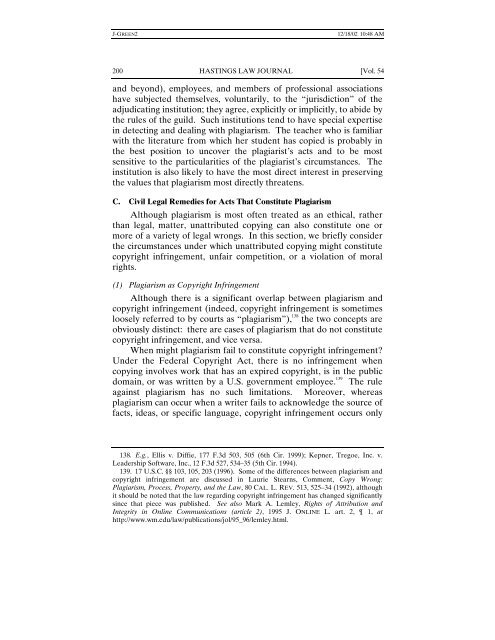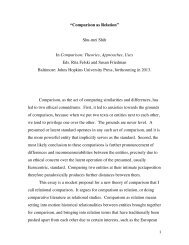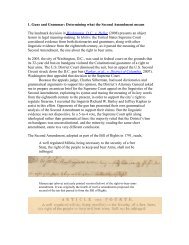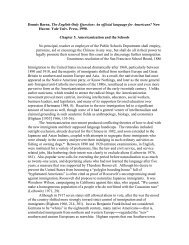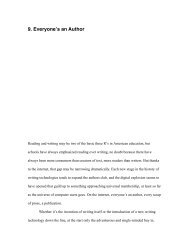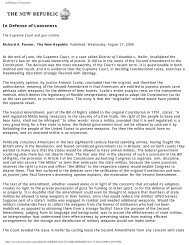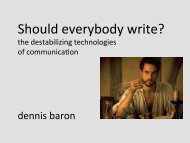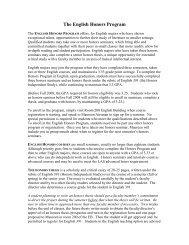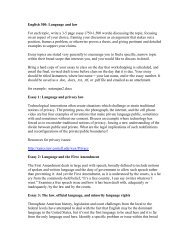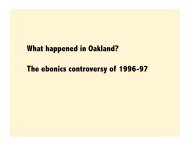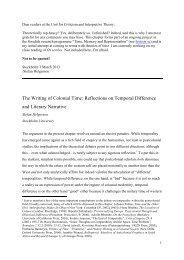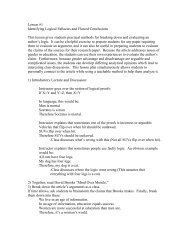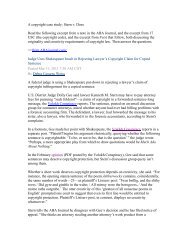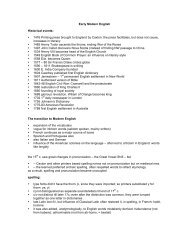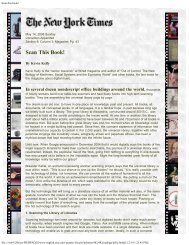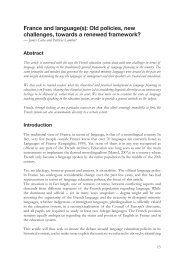Plagiarism, Norms, and the Limits of Theft Law: Some ... - English
Plagiarism, Norms, and the Limits of Theft Law: Some ... - English
Plagiarism, Norms, and the Limits of Theft Law: Some ... - English
You also want an ePaper? Increase the reach of your titles
YUMPU automatically turns print PDFs into web optimized ePapers that Google loves.
J-GREEN2 12/18/02 10:48 AM<br />
200 HASTINGS LAW JOURNAL [Vol. 54<br />
<strong>and</strong> beyond), employees, <strong>and</strong> members <strong>of</strong> pr<strong>of</strong>essional associations<br />
have subjected <strong>the</strong>mselves, voluntarily, to <strong>the</strong> “jurisdiction” <strong>of</strong> <strong>the</strong><br />
adjudicating institution; <strong>the</strong>y agree, explicitly or implicitly, to abide by<br />
<strong>the</strong> rules <strong>of</strong> <strong>the</strong> guild. Such institutions tend to have special expertise<br />
in detecting <strong>and</strong> dealing with plagiarism. The teacher who is familiar<br />
with <strong>the</strong> literature from which her student has copied is probably in<br />
<strong>the</strong> best position to uncover <strong>the</strong> plagiarist’s acts <strong>and</strong> to be most<br />
sensitive to <strong>the</strong> particularities <strong>of</strong> <strong>the</strong> plagiarist’s circumstances. The<br />
institution is also likely to have <strong>the</strong> most direct interest in preserving<br />
<strong>the</strong> values that plagiarism most directly threatens.<br />
C. Civil Legal Remedies for Acts That Constitute <strong>Plagiarism</strong><br />
Although plagiarism is most <strong>of</strong>ten treated as an ethical, ra<strong>the</strong>r<br />
than legal, matter, unattributed copying can also constitute one or<br />
more <strong>of</strong> a variety <strong>of</strong> legal wrongs. In this section, we briefly consider<br />
<strong>the</strong> circumstances under which unattributed copying might constitute<br />
copyright infringement, unfair competition, or a violation <strong>of</strong> moral<br />
rights.<br />
(1) <strong>Plagiarism</strong> as Copyright Infringement<br />
Although <strong>the</strong>re is a significant overlap between plagiarism <strong>and</strong><br />
copyright infringement (indeed, copyright infringement is sometimes<br />
loosely referred to by courts as “plagiarism”), 138 <strong>the</strong> two concepts are<br />
obviously distinct: <strong>the</strong>re are cases <strong>of</strong> plagiarism that do not constitute<br />
copyright infringement, <strong>and</strong> vice versa.<br />
When might plagiarism fail to constitute copyright infringement?<br />
Under <strong>the</strong> Federal Copyright Act, <strong>the</strong>re is no infringement when<br />
copying involves work that has an expired copyright, is in <strong>the</strong> public<br />
domain, or was written by a U.S. government employee. 139 The rule<br />
against plagiarism has no such limitations. Moreover, whereas<br />
plagiarism can occur when a writer fails to acknowledge <strong>the</strong> source <strong>of</strong><br />
facts, ideas, or specific language, copyright infringement occurs only<br />
138. E.g., Ellis v. Diffie, 177 F.3d 503, 505 (6th Cir. 1999); Kepner, Tregoe, Inc. v.<br />
Leadership S<strong>of</strong>tware, Inc., 12 F.3d 527, 534–35 (5th Cir. 1994).<br />
139. 17 U.S.C. §§ 103, 105, 203 (1996). <strong>Some</strong> <strong>of</strong> <strong>the</strong> differences between plagiarism <strong>and</strong><br />
copyright infringement are discussed in Laurie Stearns, Comment, Copy Wrong:<br />
<strong>Plagiarism</strong>, Process, Property, <strong>and</strong> <strong>the</strong> <strong>Law</strong>, 80 CAL. L. REV. 513, 525–34 (1992), although<br />
it should be noted that <strong>the</strong> law regarding copyright infringement has changed significantly<br />
since that piece was published. See also Mark A. Lemley, Rights <strong>of</strong> Attribution <strong>and</strong><br />
Integrity in Online Communications (article 2), 1995 J. ONLINE L. art. 2, 1, at<br />
http://www.wm.edu/law/publications/jol/95_96/lemley.html.


